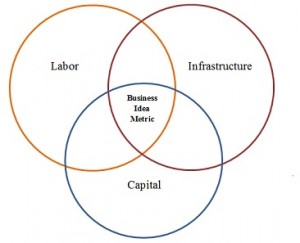The following post is from the e-book, The Most Interesting Thing About Investing in Africa, which features a series of conversations with entrepreneurs, community leaders, students, executives, and doers both home and abroad driving economic empowerment in several parts of my beloved continent of Africa.
Amara Udokporo, MHA and Kenny Udokporo, MCE, MCO
***
Amara and Kenny are investors in Net Gold Business Consulting.

Investment: Banking of the People, By the People, and For the People in Nigeria
SITUATION
The Central Bank of Nigeria (CBN) spends approximately 34 billion Naira (N34bn) a year to print new paper money due to currency mutilation. To address this critical issue of “cash waste” in Nigeria, CBN introduced the “cashless” initiative as part of an overall policy framework in 2011. The framework identified a number of cashless methods (including checks, ATM cards, online banking, and POS terminal); but the most promising solution, both from the standpoint of dealing with cash waste and pulling the unbanked out of the shadows, has been mobile money. Mobile money consists of a number of money transfer processes but it’s basically an electronic payment system that enables one individual or entity to transfer a specified financial value through a mobile phone to another individual or entity without using a bank account.

ACTION
NETGOLD MOBILE worked with the CBN to register as an aggregator and set up partnerships with CBN-licensed mobile money operators such as eTranzact International, First Bank, and Pagatech. Here’s how the work flows:
- Central Bank of Nigeria (CBN): Provides general oversight and issues licenses to the Operators.
- Mobile Money Operators: Manage the technology platform needed for the financial transaction (eTranzact, First Bank etc.).
- Aggregators: Act as the middle man between the Operators and the Agents. An aggregator is a company that is registered with a specific Operator. An aggregator recruits, trains, and manages agents within the platform. NETGOLD MOBILE is an aggregator.
- Agents: Sign up users and make a commission on the active users that they sign up. Agents are individuals recruited by an aggregator, and they can also conduct transactions on behalf of their users.
- Users: Use the mobile money service to send and receive payments. Registration is usually free.
The daily mission for NETGOLD MOBILE is to break down the banking barriers for the unbanked (many of whom are located in rural areas) while providing job opportunities for agents (many of whom were previously unemployed).

RESULT
NETGOLD MOBILE is making progress in breaking down the following mobile money barriers:
- Too Few Agents – By partnering with investors like Amara and Kenny, who have sophisticated professional and family networks that they can tap into, a concerted effort has been put in place to continue to attract more local agents.
- Lack of User Awareness – The steady increase in local agents will lead to a steady increase in user awareness. In a survey last year, it was estimated that only 57% of available users knew about the service; but that number is now on the rise.
- Agent Income and Business Model – As user awareness goes up, the earning potential for each agent goes up as well. Looking ahead…the good news is that the service continues to improve on key performance metrics and tools to help all the stakeholders involved manage the workflow.
Investment: Mobile Money Banking and “Banking On” the Unbanked in Nigeria
L = 10
I = 20
C = 10
Business Idea Metric: 40
To learn more about this service and get more information on how you can participate, please contact: Amara Udokporo | Kenny Udokporo




